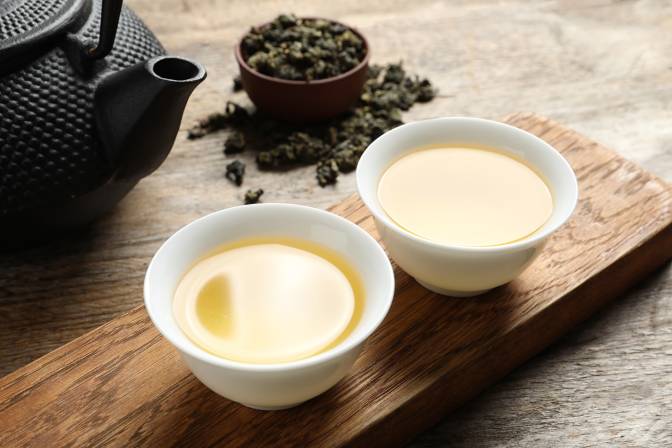Tieguanyin tea is a kind of Wuyi (Chinese: Wu- yi) puerh tea, processed in the Wuyi Mountains. Its name, “Tie-gua-yin” is translated as “The spirit of bravery”. It has the typical appearance of a wiry small tree that grows on the mountains, with green leaves growing at the tips of the branches. The best time to pick it is from mid-January to early March, when it is young and fresh. Tieguanyin tea is produced only in Chinese Wuyi Mountain areas.
Origin: Tieguanyin tea was well known among Chinese people since ancient times and was first cultivated in the Wuyi Mountains of China. The tea was called “Shuang-i-du” (Jade Buddha’s tea). The name was given by a famous Taoist monk as it resembled a jade Buddha.
The name “Tieguanyin” comes from the ancient name, which means “the spirit of bravery”. In history, Emperor Qianlong loved Tieguanyin tea so much that he ordered every day to have a cup of tea with his meals. There are so many anecdotes about this emperor that even foreigners were greatly amazed by his taste for this tea, which is considered one of the rarest and most valuable teas in the world. In the year of 1828, Tieguanyin tea was put on the list of “nine classics” of Chinese tea culture. This is the highest honor for a tea.
What are the caffeine contents in Tieguanyin Tea?
Tieguanyin tea is a green tea, which is a well-known health drink in China. Its leaves are picked from the Tieguanyin tea trees in Anxi County of Fujian. The climate of Anxi is cool and humid, which has caused the tea leaves to grow very slowly.
The caffeine content of Tieguanyin Tea can be adjusted according to the season. In summer, the average caffeine content is around 35-40mg; in winter, it will be about 30-35mg, and in spring and autumn, it will be about 20-25mg.
Taste and Characteristics:
Tieguanyin tea is very fragrant. Its taste has a fresh and clean aftertaste, with slightly sweet aroma. Tieguanyin tea is brewed using small leaf buds only, which are less oxidized than those of other teas. It is easy to brew this tea because its leaves are not large in size, but they can be brewed in several ways, including the traditional steeping method or by using a Gongfu pot or a gaiwan set.
Tieguanyin tea is a green tea, which is similar in aroma and taste to bigleaf oolong. It has a clear bitterness, with an aftertaste of citrus and a slight sweetness. In addition, Tieguanyin tea has a great ability to evenly distribute the flavor into the mouth. Sometimes, after drinking it, the tongue may feel numb.
Origins of Tieguanyin Tea?
There are many famous Tieguanyin tea masters in China. The most famous is the great master Zhang Zhong-Qing. He grew up in Yiwu Tea Town in Wuyi, Fujian, and was trained by his father Zhang Qiji. Zhang Qiji was greatly influenced by his father-in-law, Master Lao Gan (1868 –1944), a famous tea master who came from Yunnan province to teach people how to make Tieguanyin tea. The name of this tea “Tieguanyin” comes from Lao Gan’s name, “Lao Gan”, which means “spirit of bravery”.
Tieguanyin tea would be very common today if not for a few things that happened in the past few hundred years. At that time, the Wuyi Mountains were covered with wild shrubbery and many kinds of weeds could grow there. The locals selectively picked out plants and planted them in gardens. Tieguanyin tea trees grew well because they all had their own characteristics. They were seldom able to produce big leaves. The small leaves were picked and then processed into Tieguanyin tea. This is the traditional method and it is still used today for producing Tieguanyin tea.
What are the benefits of Tieguanyin tea?
Tieguanyin tea has the following health benefits. Tieguanyin tea is a stimulant, which is great for people who are tired. It can improve their brain function and concentration. The polyphenol in this tea is a strong antioxidant and can help prevent cancer and diabetes. It can also prevent cardiovascular diseases, eye diseases, arthritis and also helps weight loss by suppressing appetite in obese people.
Health Benefits of Tea:
Tieguanyin Removes Fatty Acid Oxidation: The polyphenols in Tieguanyin tea benefit in reducing fat oxidation by inhibiting the production of nitric oxide and peroxynitrite, which are responsible for the release of free fatty acids that are harmful to the heart.
Prevents Heart Diseases
The polyphenols in Tieguanyin tea also have a positive effect on preventing heart diseases, because they can inhibit the formation of lipids, which may cause cholesterol deposits and atherosclerosis. It can also help prevent high blood pressure and arteriosclerosis.
Anti-Aging
Tieguanyin tea also has anti-aging characteristics, because it can lower the bad cholesterol levels in the blood. This reduces the risk of atherosclerosis and heart disease. Stimulates Brain Function
It is beneficial for people to drink Tieguanyin tea because it can improve brain function. It can improve memory and concentration, and also enhance learning ability in children.
Prevents Cancer
The polyphenols in Tieguanyin tea also have an anti-cancer effect. It has the ability to inhibit the growth of cancer cells, which may prevent the development of tumor in humans (such as leukemia). Tieguanyin tea can also prevent breast cancer by inhibiting estrogen production. This is because polyphenols in this tea are able to bind estrogen receptors at a molecular level, blocking them from binding with estrogen.
Lowers Blood Pressure
Tieguanyin tea also has anti-hypertension effects. It can lower blood pressure in people who have high blood pressure, because it can inhibit angiotensin II, which is the hormone responsible for causing high blood pressure.
Anti-Diabetes
The polyphenols in Tieguanyin tea also have a positive effect on preventing diabetes by inhibiting insulin secretion from the pancreas, thereby blocking the sugar absorption into the body’s cells.

